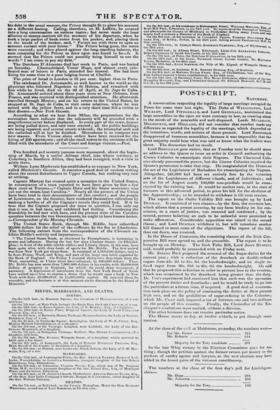POSTSCRIPT.
SATURDAY.
A conversation respecting the legality of large meetings occupied the Peers for some time last night. The Duke of WELLINGTON, Lord Wiciumw, Lord FITZGERALD, and Lord GLENGALL, maintained that large assemblies in the open air were contrary to law, as creating alarm in the minds of the peaceable and well-disposed. Lords A1ULGRAVE, MELBOURNE, and HOLLAND, did not consider that number made any difference as regarded the legality of the meetings, which depended on the intentions, words, and actions of those present. Lord Baououtat disapproved of immense assemblies, because it was impossible that the great majority could hear what was said or know what the leaders were about. The discussion had no result.
Lord BROUGHAM gave notice, that on Tuesday next he should move an address to the Queen to issue an order in Council authorizing the Crown Colonies to emancipate their Negroes. The Chartered Colo- nies already possessed the power, but the Crown Colonies required the Queen's permission to take that step. He congratulated the House on the act of the Legislature of Barbadoes for emancipating the Negroes. Altogether, 241,000 had been set entirely free by the voluntary acts of the Legislatures of different iilands, and of individuals ; and on the 1st of August nearly 100,000 non-prmdials would be eman- cipated by the existing law. It would be useless now, in the state of business at this advanced period, to press his bill for the abolition of the Apprenticeship; so he intended to withdraw it till next session.
The report on the Oaths Validity Bill was brought up by Lord
DENMAN. It consisted of two clauses—by the first, the common law, NVIliCh allows that a person swearing, by any form binding on his con- science, in a court of justice, was restored and confirmed ; by the second, persons believing an oath to be unlawful were permitted to make affirmation. Considerable opposition was raised to the second clause ; and Lord DENMAN withdrew it, but will introduce another bill framed to meet some of the objections. The report of the bill, thus cut down, was received.
In the House of Commons, the remaining clauses of the Irish Cor-
poration Bill were agreed to, and the preamble. The report is to be brought up on Monday. The Irish Tithe Bill, Lord JOHN RUSSELL said, would probably be proceeded with on Friday next.
Mr. SPRING RICE proposed the renewal of the Sugar-duties for the current year; with a reduction of the drawback on double-refined sugars from 4:k. 2d. to 33s. Sd. the hundredweight, and on single re- fined sugar frOITI 36s. 10d. to 30s. 8d. the hundredweight. Ile said that be proposed this reduction in order to prevent loss to the revenue, which was occasioned by the drawback being greater than the duty. Dr. tire's experiment had convinced him that such was the operation of the present duties and drawbacks ; anti be would be ready to go into the particulars at a future time, if required. A good deal of conversa- tion took place on the policy of continuing the duties at their present high rate, and on the prohibition of sugar-refining in the Colonies; which Mr. CLAY said, imposed a tax of between one and two millions on the people of this country. Filially, the Chancellor of the Ex- chequer's resolutions vere carried, without a division.
The other business dues not require particular notice.
The House meets to-day, at twelve o'clock, to get through some routine.


























 Previous page
Previous page